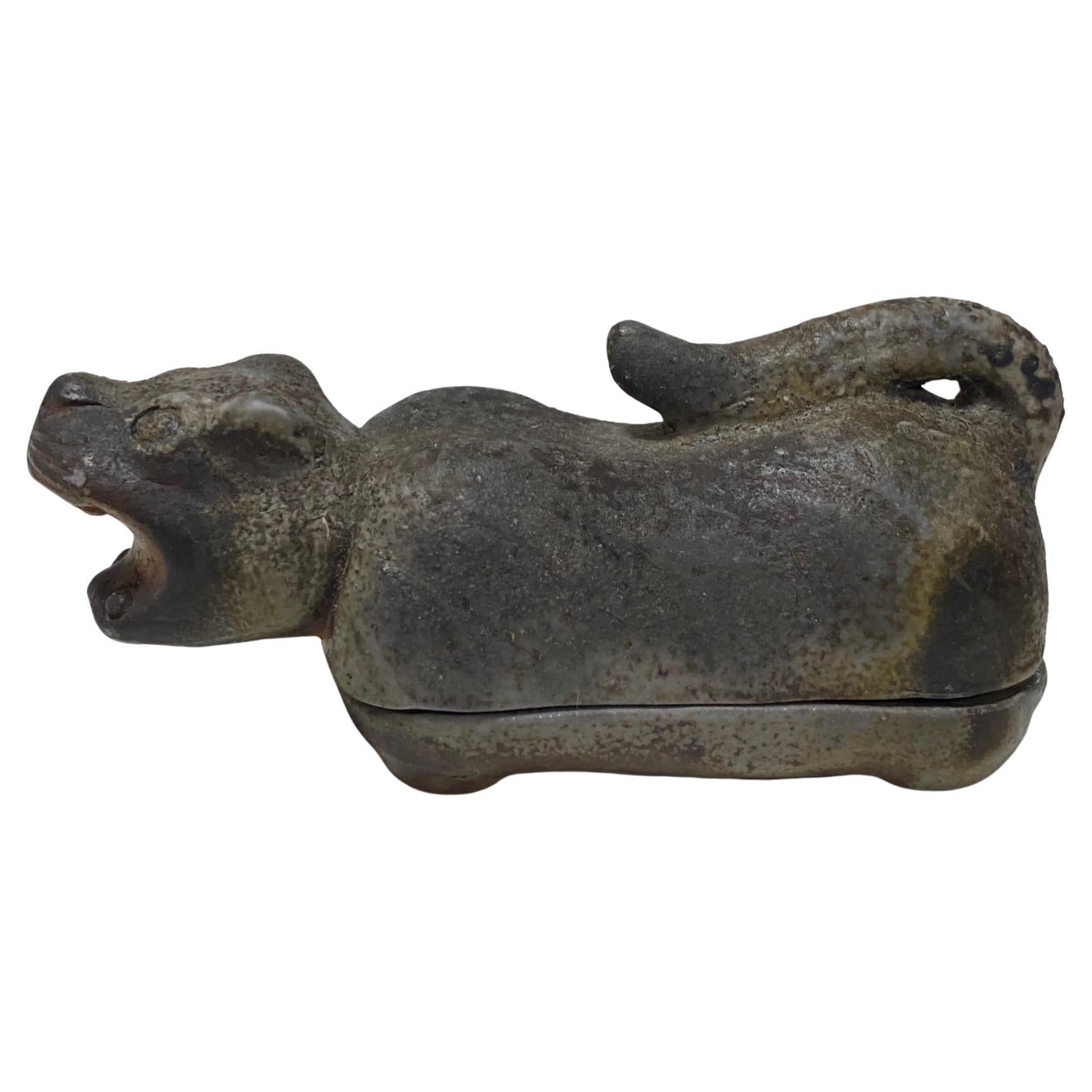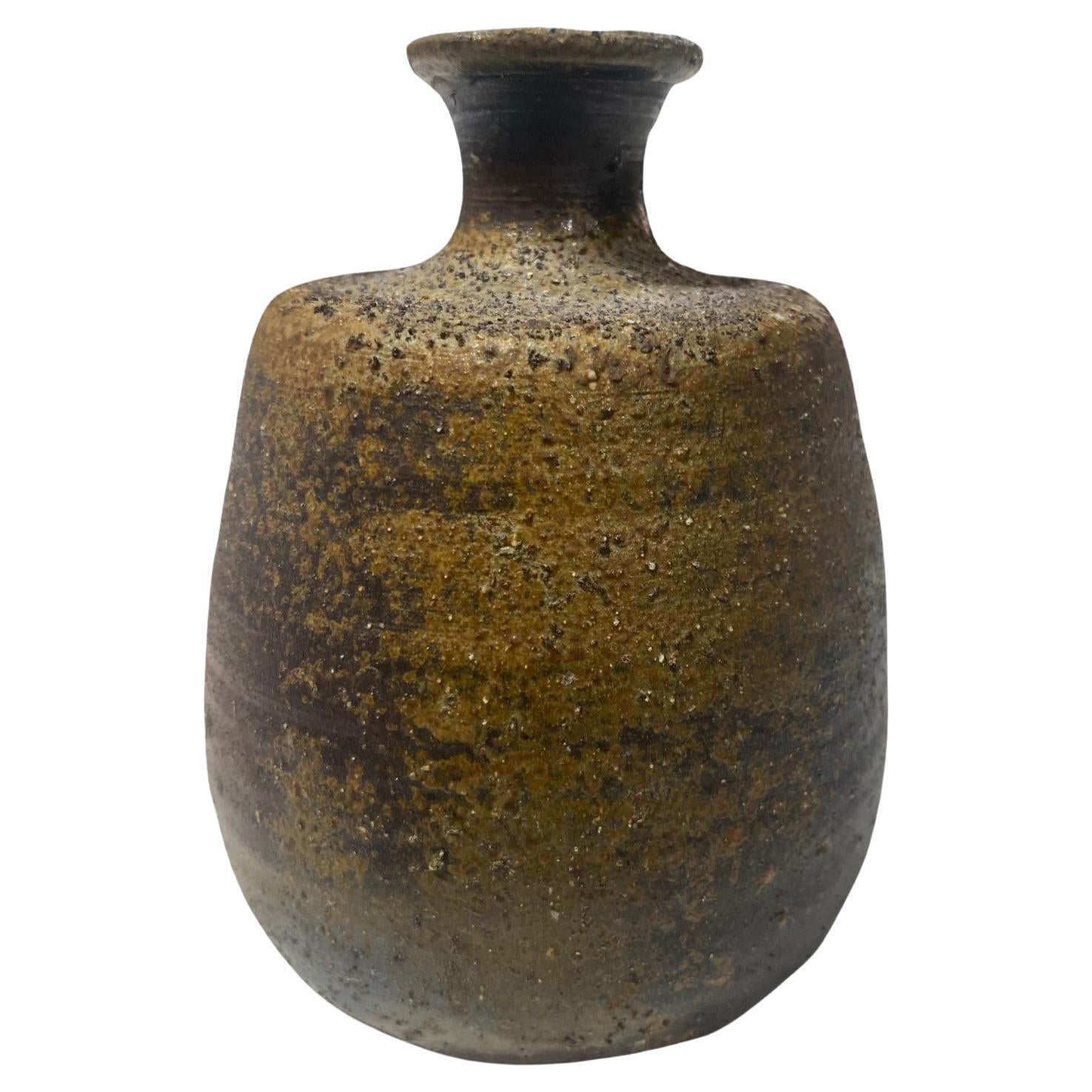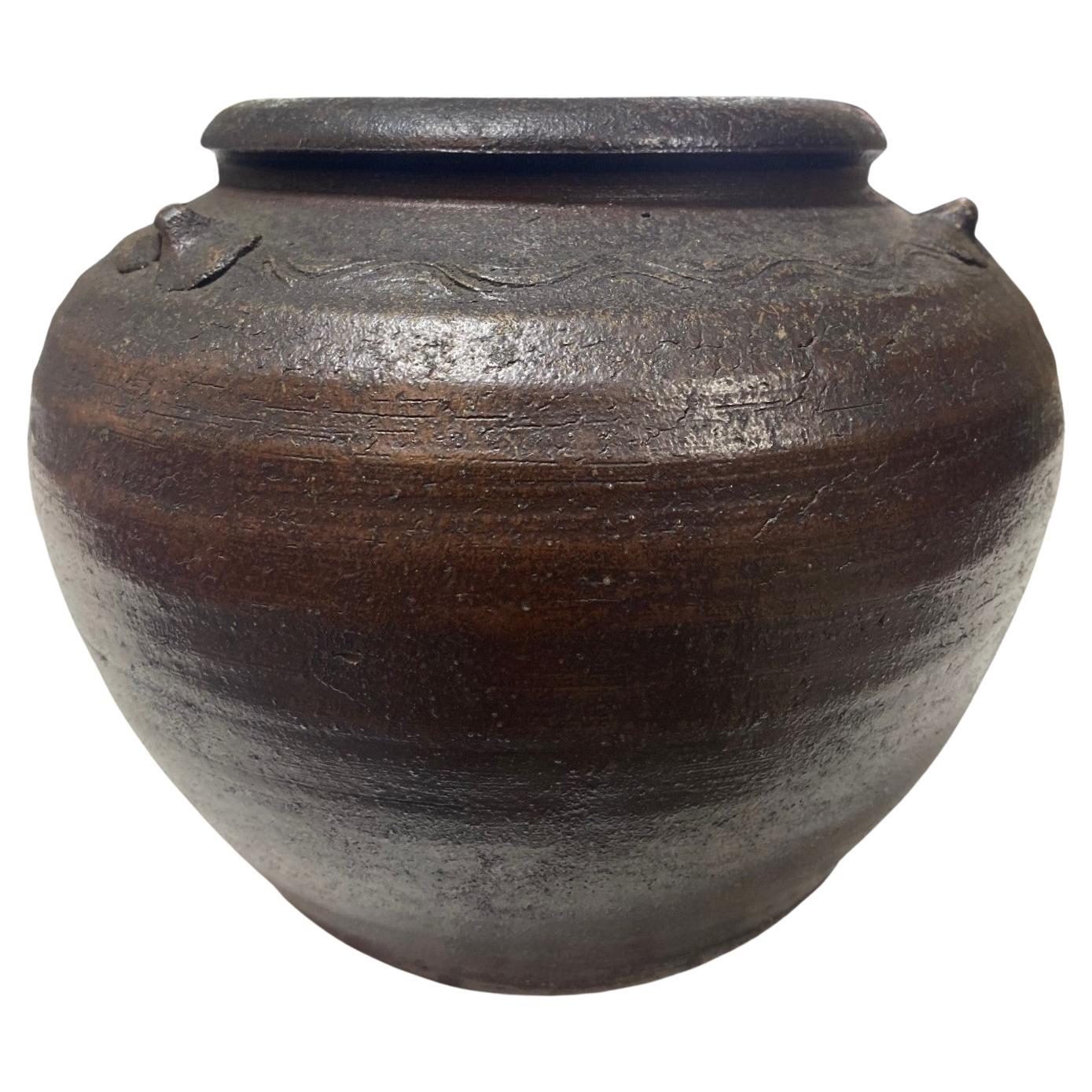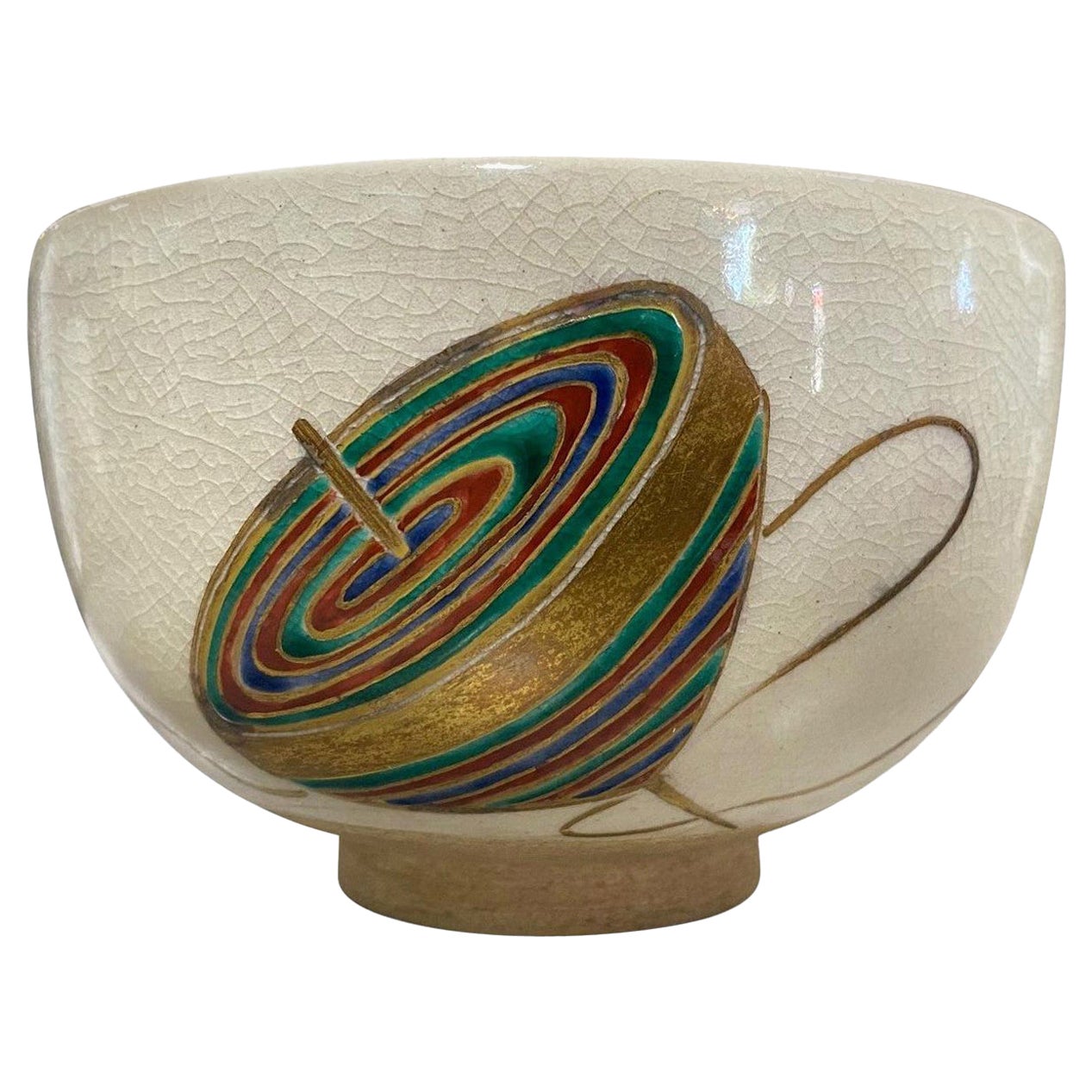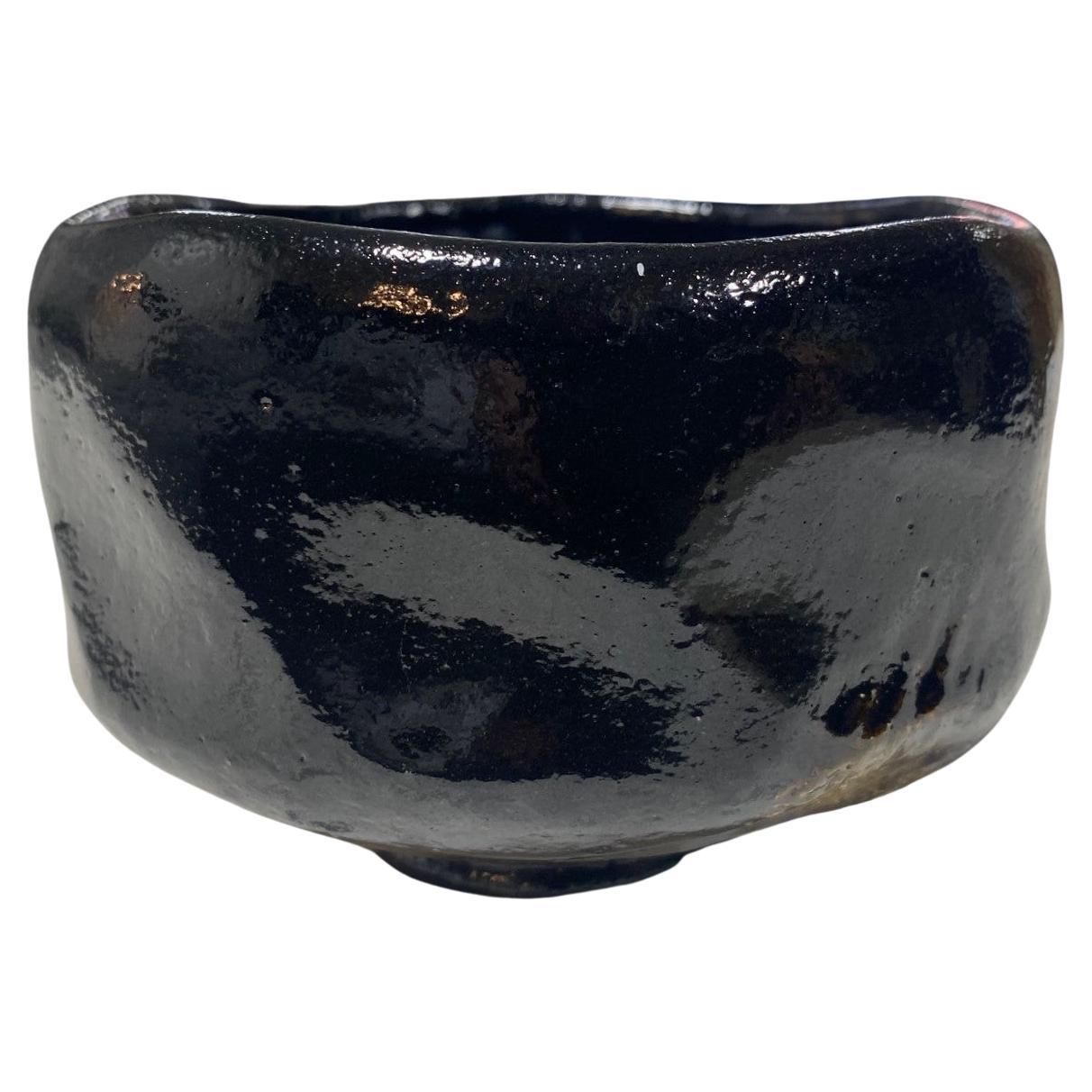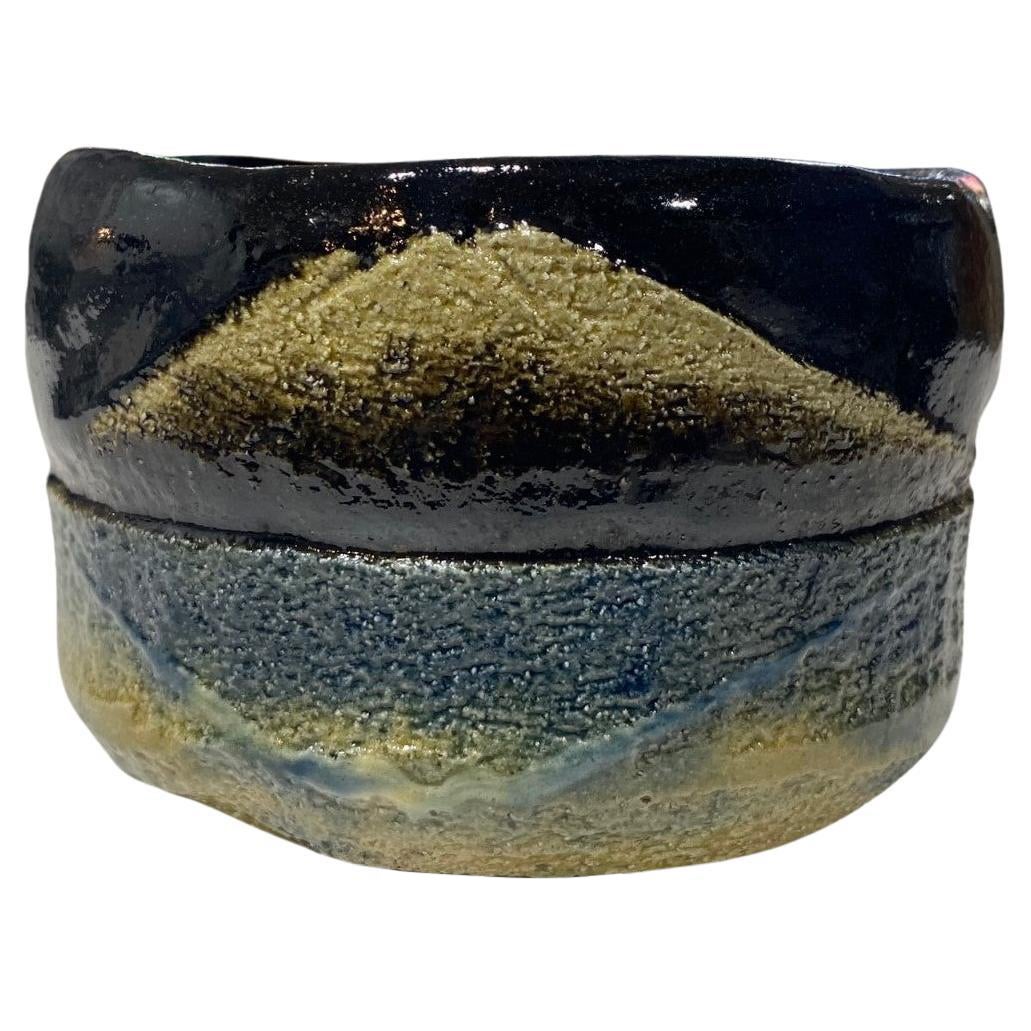Items Similar to Kaneshige Toyo National Treasure Signed Japanese Bizen Pottery Chawan Tea Bowl
Want more images or videos?
Request additional images or videos from the seller
1 of 21
Kaneshige Toyo National Treasure Signed Japanese Bizen Pottery Chawan Tea Bowl
About the Item
A beautiful, perfectly shaped antique Bizen ware Chawan tea bowl by renowned Japanese master potter/artist Kaneshige Toyo (1896-1967) featuring a unique natural, organic forming ash glaze. Kaneshige is universally considered to be the founder of modern Bizen pottery.
In 1956, Kaneshige was certified as a Living National Treasure (Important Intangible Cultural Heritage) for his work in Bizen Ware pottery/ceramics. Bizen Ware is a type of Japanese pottery traditionally from the Bizen province, presently a part of the Okayama prefecture. It is considered one of the Six Ancient Japanese Kilns (along with Echizen ware, Seto ware, Shigaraki ware, Tamba ware, and Tokoname ware).
The piece is signed/ sealed on the base with one of Kaneshige's traditional incised marks.
A rather engaging and scarce work. Would be a fantastic addition to any Japanese/Asian pottery or Bizen Ware collection or eye-catching stand-alone work in about any setting.
Kaneshige's work can be found in numerous prominent collections and museums including:
Aichi Prefectural Ceramic Museum, Seto, Japan
Brooklyn Museum, NY
Hagi Uragami Museum, Yamaguchi, Japan
Honolulu Art Museum, HI
Ibaraki Ceramic Art Museum, Kasama, Japan
Indiana Art Museum, Bloomington, IN
Ishikawa Prefectural Museum of Art, Kanazawa, Japan
Kano Museum, Aki, Japan
Menard Art Museum, Komaki, Japan
Mt. Holyoke College Art Museum, South Hadley, MA
National Museum of Modern Art, Kyoto, Japan
National Museum of Modern Art, Tokyo, Japan
National Treasures Museum, Yugawara, Japan
Nelson-Atkins Museum of Art, Kansas City, MO
Okayama Prefectural Museum of Art, Japan
Samuel P. Harn Museum of Art, Gainesville, FL
University of Michigan Museum of Art, Ann Arbor, MI
Yale University Art Gallery, New Haven, CT
The work comes with a wood storage box.
Storage box dimensions: 4.7" high, 6" wide. 6" deep
Tea bowl dimensions: 2.75" high, 5.1" wide, 5.1" deep.
- Dimensions:Height: 4.75 in (12.07 cm)Width: 6 in (15.24 cm)Depth: 6 in (15.24 cm)
- Style:Showa (Of the Period)
- Materials and Techniques:
- Place of Origin:
- Period:
- Date of Manufacture:Mid-20th Century
- Condition:In very good to excellent vintage condition with no discernable flaws, cracks, chips, etc... and light if any wear consistent with age and use (please see photos). Beautiful and special overall.
- Seller Location:Studio City, CA
- Reference Number:1stDibs: LU2254333877672
About the Seller
4.9
Platinum Seller
These expertly vetted sellers are 1stDibs' most experienced sellers and are rated highest by our customers.
1stDibs seller since 2016
766 sales on 1stDibs
Typical response time: <1 hour
- ShippingRetrieving quote...Ships From: Studio City, CA
- Return PolicyA return for this item may be initiated within 7 days of delivery.
More From This SellerView All
- Kaneshige Toyo National Treasure Signed Japanese Bizen Tea Ceremony ContainerLocated in Studio City, CAA beautiful, and somewhat whimsical antique Bizen ware stoneware pottery tea ceremony container (stated on the box) or incense burner by renowned Japanese master potter/artist Kanesh...Category
Mid-20th Century Japanese Showa Ceramics
MaterialsStoneware
- Kaneshige Toyo National Treasure Signed Japanese Bizen Pottery Sake Bottle VaseLocated in Studio City, CAA beautiful, perfectly shaped and balanced antique Bizen ware shibui sake bottle (tokkuri) vase by renowned Japanese master potter/artist Kaneshige Toyo (1896-1967) featuring a unique natural, wonderfully textured organic forming ash glaze. Kaneshige is universally considered to be the founder of modern Bizen pottery. In 1956, Kaneshige was certified as a Living National Treasure (Important Intangible Cultural Heritage) for his work in Bizen Ware pottery/ceramics. Bizen Ware is a type of Japanese pottery traditionally from the Bizen province, presently a part of the Okayama prefecture. It is considered one of the Six Ancient Japanese Kilns (along with Echizen ware, Seto ware, Shigaraki ware, Tamba ware, and Tokoname ware). The piece is signed/ sealed on the base with one of Kaneshige's traditional incised marks. A rather striking and engaging work. One of the best Kaneshige works we have come across. Scarce and hard to find in such an excellent condition. Would be a fantastic addition to any Japanese/Asian pottery or Bizen Ware collection or eye-catching stand-alone work in about any setting. Kaneshige's work can be found in numerous prominent collections and museums including: Aichi Prefectural Ceramic Museum, Seto, Japan Brooklyn Museum, NY Hagi Uragami Museum, Yamaguchi, Japan Honolulu Art Museum, HI Ibaraki Ceramic Art Museum, Kasama, Japan Indiana Art...Category
Mid-20th Century Japanese Showa Ceramics
MaterialsStoneware
- Kaneshige Toyo National Treasure Signed Japanese Bizen Pottery Tsubo Jar VaseLocated in Studio City, CAA beautiful, darkly fired, antique Bizen ware three-ear tsubo jar/pot/vase by renowned Japanese master potter/artist Kaneshige Toyo (1896-1967) featuring a l...Category
Mid-20th Century Japanese Showa Ceramics
MaterialsStoneware
- Shiko Shikou Munakata Rare Signed Japanese Pottery Chawan Tea Bowl Signed BoxBy Shikou MunakataLocated in Studio City, CAAn exceptionally rare, wonderfully designed Chawan tea bowl by famed Japanese master woodblock printmaker/ artist Shiko Munakata (1903-1975) who is widely considered to be the most important Japanese visual artist of the 20th century and the Pablo Picasso of Japan. This hand-painted work clearly illustrates Munakata's whimsical side as it is of a Koma - a child's spinning top toy. Very few examples of Munakata's work in ceramics exist still today. The work is signed by Munakata on the base as well as the original wood protective storage box (his seal can also be seen faintly in the lower-left corner). The bowl has a small kintsugi or "golden joinery" repair - the Japanese art of repairing broken pottery by mending the areas of breakage with lacquer dusted or mixed with powdered gold - on the inside. As a philosophy, it treats breakage and repair as part of the history of an object, rather than something to disguise. Munakata who is often compared to Picasso was primarily associated with and a principal figure in both the Sosaku-Hanga (which stressed the artist as the sole creator ) and the Mingei (folk art) movements. His many accolades and awards include the "Prize of Excellence" at the Second International Print Exhibition in Lugano, Switzerland in 1952, and first prize at the São Paulo Bienal Exhibition in Brazil in 1955, followed by the Grand Prix Award at the Venice Biennale in 1956, and the Order of Cultural Merit, the highest honor in the arts by the Japanese government in 1970. In 1960 after returning from a year abroad exhibiting his work in the United States, the Horinji Temple in Kyoto bestowed upon him the honorary rank of “Hokkyo”. In 1962, he received the rank of “Hogan” from Nisseki Temple in Toyama prefecture. He also received a Medal of Honor in 1963 and the Asahi Shimbun culture prize in 1965. Munakata's work can be found in numerous international collections and museums including: The Britsih Museum, UK The Chicago Art Institute Museum of Modern Art (MOMA), NY The Metropolitan Museum of Art (The Met), NY The Philadelphia Museum of Art The Smithsonian American Art Museum (SAAM), Washington DC Kemper Art Museum, St. Louis And his own museum The Munakata Shiko...Category
Mid-20th Century Japanese Showa Ceramics
MaterialsCeramic
- Sasaki Shoraku III Signed Japanese Raku Pottery Chawan Tea Bowl with Signed BoxLocated in Studio City, CAA wonderful Raku-fired pottery Chawan tea bowl by a renowned Japanese pottery master and one of Kyoto’s most prominent and best-known Raku-yaki potters Sasaki Shoraku III (1944- ). The work features a beautifully contoured body and dark rich glaze. The Shoraku line began when the grandfather of the current potter established a kiln near the famous Kiyomizu Temple, nestled at the foot of the eastern mountains...Category
20th Century Japanese Showa Ceramics
MaterialsPottery
- Sasaki Shoraku III Signed Japanese Raku Pottery Chawan Tea Bowl with Signed BoxLocated in Studio City, CAA wonderful Raku-fired pottery Chawan tea bowl by a renowned Japanese pottery master and one of Kyoto’s most prominent and best-known Raku-yaki potters Sasaki Shoraku III (1944- ). The work features a beautiful image of Mount Fuji which is molded on the body. The Shoraku line began when the grandfather of the current potter established a kiln near the famous Kiyomizu Temple, nestled at the foot of the eastern mountains...Category
20th Century Japanese Showa Ceramics
MaterialsPottery
You May Also Like
- Korean Gohon Chawan Tea Bowl for Japanese Market Joseon DynastyLocated in Atlanta, GAA ceramic chawan (tea bowl) circa 17-18th century fired in the Busan kiln in Korean specifically for the Japanese market. The kilns were run by the So c...Category
Antique 17th Century Japanese Edo Ceramics
MaterialsCeramic
- Vintage Japanese Oribe Ware Tea Bowl, Chawan, by Matsumoto TetsuzanLocated in Austin, TXA charming vintage Japanese oribe glazed chawan by Matsumoto Tetsuzan (b. 1955), Seto, Japan. The tea bowl, called a chawan, wonderfully potted with...Category
Early 2000s Japanese Edo Ceramics
MaterialsStoneware
- Korean Ceramic Kakinoheta Chawan Tea BowlLocated in Atlanta, GAA "Kakinoheta" type ceramic chawan (tea bowl) made in Korean during Joseon dynasty circa 16th-17th century. The bowl has a slight irregular flat shape w...Category
Antique 17th Century Korean Other Ceramics
MaterialsCeramic
- Korean Ceramic Irabo Tea Bowl Chawan Joseon DynastyLocated in Atlanta, GAA ceramic chawan tea bowl made in Korea for Japanese market circa 17th century. The chawan is identified as Irabo type. Irabo bowls were essentially con...Category
Antique 17th Century Korean Other Ceramics
MaterialsCeramic
- Antique Korean Mishma Tea Bowl Chawan Joseon DynastyLocated in Atlanta, GAA Korean Hori-Mishima Chawan (tea bowl) circa 16th-17th century (Joseon Dynasty). The tea bowl is of an upright conical form supported by a high foot ring. It was decorated with incised brushwood fence patterns filled with white slip on both the interior and exterior surface. These dominant motifs were spaced by three encircling double lines. Seven chrysanthemum flowers (inka) were stamped on the lower interior surrounding a swirling tea well on the bottom. There are six spur marks known as Meato in Japanese on the interior bottom and a pointy spot in the center of the foot ring known as Tokin. Two crack lines were historically repaired by superb Kintsugi, adding a mysterious wabi-sabi appeal to the piece. The Hori-Mishima bowl was also known as Gohon Mishima. It was made in Bushan Kilns of the Southern Gyeongsang Province specifically for the Japanese market in the 16th-17th century, when the tea ceremonies in Japan demanded such ware. The bowl comes with a purple fabric pouch...Category
Antique 17th Century Korean Other Ceramics
MaterialsCeramic
- Korean Ceramic Ido Tea Bowl Chawan Joseon DynastyLocated in Atlanta, GAA ceramic stoneware chawan tea bowl made in Korea circa 16-17th century. The chawan is identified as Ko-ido (small ido) due to its size and form. Ido bowls were made since 15th centu...Category
Antique 17th Century Korean Other Ceramics
MaterialsCeramic
Recently Viewed
View AllMore Ways To Browse
Treasured Vintage
Ancient Japan
Ancient Japanese
Japan Pottery
Japanese Wood Sign
Treasure Craft
Used Ceramics Kilns
Vintage Japanese Marks
Ancient Japanese Furniture
Traditional Vintage Japanese Art
Retro Japanese Ceramics
Asian Seal
Vintage Treasure Craft
Midcentury Japanese Ceramics
Fire Bowl
Japanese Stoneware
Stoneware Japan
Brooklyn Ceramics
